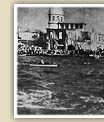
This is probably the most crucial period as concerns Greek foreign policy and the gratification of national
claims, as the latter have been shaped in the context of irredentism and the vision of the Great Idea that have been
promoted to central axes of the Greek national ideology already ever since the formation
of the Greek state. The policy of irredentism has been put to the test throughout this period,
sometimes with success as was the case of the two Balkan wars (1912-13, 1913-14) and
the First World War and sometimes with disastrous results as was the case with the operations
of the Greek army in Asia Minor (1919-1922).
This is also a period when Balkan nationalisms seethe and being competitive
among them were claiming the same regions and attempted to secure territories that would allow
the viability and the growth of respective national states. The Balkan states confronted both
the Ottoman empire and with each other for the annexation of territories and populations
in a sensitive area, where population groups of different cultural identity and often not clearly
defined national conciousness co-existed.
|
 |

The victorious Balkan Wars (First and Second Balkan War) gained for
Greece the territories of Macedonia, Epirus and Crete and dominion over
the islands of the northeastern Aegean.
The Greek foreign policy of that period bears the mark of the personality and
the handlings of Eleftherios Venizelos. The Cretan statesman passionately supported
Greek expansion, in the framework of the conjucntion of circumstances of the period
while being harnessed to the democratic countries of western Europe and Great Britain in particular.
The other factor that contributed to the shaping of the foreign policy of the period was
King Constantine I, who supported Greek neutrality, favouring the Central Powers, due
to actual kinship and politico-ideological affinities with them. Around him rallied those
opposing the Venizelist policy as a whole, at the same time reacting to the domestic
socio-political reforms intoduced by Venizelos. The acute disagreement of the Prime Minister
and the King led to the National Schism that terminated with the predominance of the
Venizelists and the entrance of Greece in the war on the side of the British and the French.
During the First World War and amidst the colonial competition of the Great Powers in the
area of the Balkans and the eastern Mediterranean more generally, Greece tried to secure the largest
possible territorial gains from the crumbling Ottoman empire.
|
 |

The Asia Minor Campaign was launched in an attempt of Greece, being an ally of the victorious
Powers and member of the Paris Peace Conference, to fulfil her pursuits.
With the short-lived Treaty of Sevres Greece acquired for a while
her largest territorial expansion, gaining the Dodecanese islands, Thrace and a zone
in western Asia Minor around Smyrna. The "Greater Greece of the two
continents and of the five seas" became an actuality or a brief period. The competition
however of the interests of the western allies and the reversal of their Eastern policy,
in combination with the political change of November 1920 that restored to the throne
the undesirable to the allies King Constantine I, overturned this actuality. The venture of
the Asia Minor Campaign terminated with the definite departure of the Greek element from
its hearths in Thrace, Pontos and Asia Minor.
From the "Greece of the Treaty of Sevres" only western Thrace and the ratified
dominion over the Aegean islands remained. As a whole, in the period
1912-22 Greece doubled her territory and population acquiring her definite
borders with the exclusion of the Dodecanese islands, that continued to be under Italian
occupation until the end of the Second World War. In the same period the remaining national claims,
northern Epirus and Cyprus, will be the object of negotiations, but the chance of their becoming annexed
to the Greek state will be definitely eliminated.
From the following period, the inter-war period, Greek foreign policy
will fully change course, abandoning every Great Idea aspiration
and putting as objective the peaceful co-existence with Turkey and the other Balkan
states and the defence of national territory from every possible threat.
|
 |
